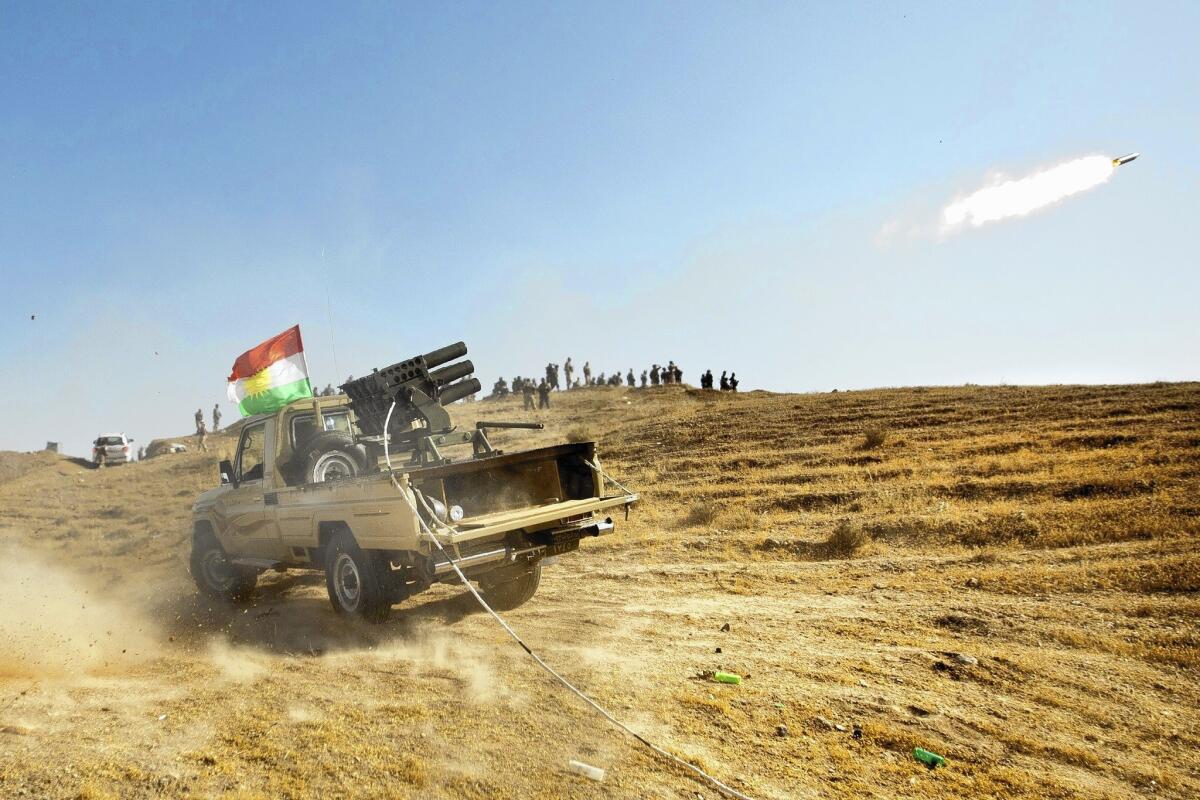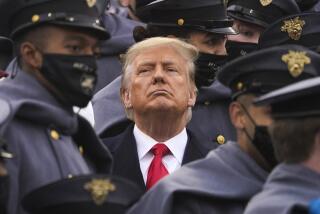Obama’s Mideast airstrike refrain: ‘And then what?’

- Share via
Reporting from Washington — Last fall, as President Obama weighed airstrikes against Syria, deliberations followed a clear pattern: The president solicited scores of options, planners returned with possibilities, and, according to people involved, Obama would reply with the same question: And then what?
Over the last several days, with Obama mulling involvement in another Middle East conflict, this time in Iraq, that dynamic has held.
The result is a policy that so far has put on hold calls from the Iraqi government for U.S. airstrikes against Sunni Islamic militants who have seized territory north and west of Baghdad. Instead, aides say Obama is waiting for evidence that the Iraqi government, which is dominated by Shiites, is willing to reach political reconciliation with Sunni groups.
One senior official said the president is considering drone strikes, akin to those against alleged terrorist targets in Yemen, rather than rolling airstrikes like the shock-and-awe campaigns of the gulf wars. The president told congressional leaders Wednesday that he does not believe he needs their authorization for the actions he would take in Iraq, Senate Minority Leader Mitch McConnell (R-Ky.) said after the meeting.
Even a limited use of air power to attack leaders of the militant force, the Islamic State of Iraq and Syria, or ISIS, may not be imminent. Gen. Martin Dempsey, the chairman of the Joint Chiefs, told a Senate subcommittee Wednesday that the U.S. would need a better understanding of the targets before he would recommend any attack.
“It’s not as easy as looking at an iPhone video of a convoy and then immediately striking it,” Dempsey said. “Until we can actually clarify this intelligence picture, the options will continue to be built and developed and refined, and the intelligence picture made more accurate,” he said.
But the delay isn’t just about intelligence gathering. Obama’s approach — the persistent “and then what?” question — reflects his deep skepticism about the ability of military intervention to fix entrenched problems, a suspicion that some note has grown, or at least solidified, during his tenure.
“He genuinely believes that he was elected to get America off its war footing, that his legacy is to get the U.S. away from its over-reliance on the military instrument,” said Julianne Smith, former deputy national security advisor to Vice President Joe Biden. “There’s just a fundamental strategic framework for him that tilts toward not intervening and looking to see what other instruments are available to deal with a crisis.”
The conflict in Iraq has helped forge that view. Obama’s opposition to the 2003 U.S.-led invasion, which began eight years of what he called “dumb war,” propelled his career. In remarks last week at the White House, he was blunt about his reluctance to let the U.S. be “dragged” back in to restore order.
“We can’t do it for them,” he said.
His experiences in office have only enhanced his skepticism. Twice in his presidency, in Afghanistan and Libya, Obama has accepted advice to use military force in an effort to recast a country’s political system. Neither has turned out as he hoped.
In the current Iraq crisis, officials say, Obama has focused intensely on whether any recommended military action would yield some lasting political progress, or whether the move might do more long-term harm, even if it provides some quick relief.
Obama’s critics say that the U.S. risks seeing sacrifices made by tens of thousands of American troops in Iraq go for naught. Allowing large chunks of territory to remain under the control of ISIS, an Al Qaeda breakaway faction, could lead to a heightened threat of terrorist actions against the U.S. and its allies, Sen. Lindsey Graham (R-S.C.) and other GOP leaders have warned.
Presidential inaction has helped create the problems, abdicating leadership and ceding influence to rival Iran, the critics say.
In a Wall Street Journal opinion article Wednesday, former Vice President Dick Cheney and his daughter Liz harshly criticized Obama, calling him “blithely unaware or indifferent to the fact that a resurgent Al Qaeda poses a clear and present danger to the United States of America.”
So far, however, the president has not been convinced that Iraqi leaders have moved significantly toward a unity government, and doesn’t appear to think a new U.S. intervention alone will be able to accomplish what years of war did not.
“If 150,000 U.S. troops did not compel a nonsectarian politics in Iraq, airstrikes aren’t going to do it on their own, either,” said deputy national security advisor Ben Rhodes. “That doesn’t mean there’s no role for military action. It just means that’s not the panacea here.”
That view won support Wednesday from the general who was the architect of the so-called troop surge under George W. Bush. The U.S. should reengage militarily in Iraq only if the country’s sectarian communities reach a political agreement, retired Gen. David Petraeus said at a conference in London.
“This cannot be the United States being the air force for Shia militias, or a Shia on Sunni Arab fight,” he said.
White House officials have left themselves an opening to act even if the Iraqis haven’t moved toward reconciliation. The president hasn’t ruled out the possibility that U.S. action may come first — as a way to buy time, said another official, who spoke on condition of anonymity in order to discuss internal deliberations.
During his 5 1/2 years in office, Obama has mostly used the military in narrowly defined missions. He has embraced limited strikes, including the use of drones to target leaders of militant groups, partnerships with allies and covert operations to advance U.S. interests.
“If you look at this president’s use of Special Forces and small interventions and partnering, you’d see he’s been more comfortable in those areas,” said Anthony Cordesman, a defense analyst who has advised the Pentagon on Afghanistan.
But on larger issues of strategy, White House officials say Obama sees his role in part as resisting the impulse to overreact, with the aim of avoiding big mistakes. In the case of Iraq, Obama said late last week that he would be reviewing options for “days,” and officials have not given any end date for that process.
“This is a president who has probably spent more time developing options than any other president in recent memory,” Cordesman said. “But [he] also finds it harder to make choices between them.”
When the president has opted for military action, the lessons have tended to be negative. In Libya, Obama organized a coalition to bring down Moammar Kadafi, but so far, the result has been a country in near anarchy and widespread violence, including the killing of the U.S. ambassador in 2012.
In Afghanistan, Obama endorsed a surge of troops soon after taking office. Now, with most U.S. troops set to leave by the end of this year, there’s no certainty that the U.S.-trained Afghan army will be able to secure the country. More ambitious U.S. goals of modernizing Afghanistan’s society seem even further from achievement.
There are also political considerations. In his first term, Obama largely avoided being branded weak or feckless on foreign policy — labels that have burdened past Democratic presidents. Wednesday, however, a new Wall Street Journal/NBC News poll showed Obama’s approval rating on foreign affairs had hit 37%, a new low in the survey.
“For the first time, they are wondering about whether they have to look strong,” said Jeremy Shapiro, a Middle East expert at Washington’s Brookings Institution who until recently served in the State Department. “I think that the president is going to be very loath to submit to those pressures,” Shapiro said. But if the decision on force becomes a “close call,” then “it’s more possible now than it was last year.”
On the other hand, public opinion — particularly within the president’s party — remains highly skeptical of U.S. military involvement in the Middle East. Before meeting with Obama on Wednesday, Senate Majority Leader Harry Reid of Nevada returned to remarks he made before the U.S. withdrawal from Iraq more than two years ago.
“After a decade of war, the American people have had enough,” Reid said. “This is an Iraqi civil war and it is time for the Iraqis to resolve it themselves.”
More to Read
Sign up for Essential California
The most important California stories and recommendations in your inbox every morning.
You may occasionally receive promotional content from the Los Angeles Times.















